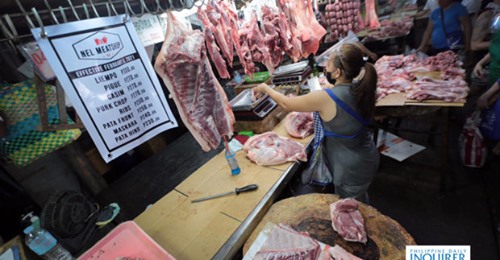MANILA, Philippines — An official from the National Economic and Development Authority (NEDA) admitted to House lawmakers on Monday that there is “no plan B” should the temporary cut on pork import tariffs and the increase in importation not lead to lower prices.
“Sa computation po namin, walang [In our computation, there is no] Plan B kasi [because] we really want to quickly lower the price,” NEDA Undersecretary Mercedita Sombilla said during a joint hearing of the House agriculture and trade committees on Monday.
This, after Navotas City Rep. John Rey Tiangco, chairperson of the trade panel, asked NEDA if it readied a Plan B if lowering pork import tariffs and increasing the minimum access volume (MAV) for imported pork would still not reduce prices.
“Paano kung ginawa na natin ‘to tapos ‘di pa rin napababa yung presyo? Ano yung Plan B niyo? Or meron ba tayong Plan B [What if we’re doing all of these and yet prices are not reduced? What’s your Plan B? Or do you even have a Plan B?]?” Tiangco asked.
President Rodrigo Duterte on April 7 signed Executive Order No. 128, which temporarily lowers tariff rates on fresh, chilled, or frozen pork meat “to address the existing pork supply shortage, stabilize prices of pork meat, and minimize inflation rates.”
In addition to lowering pork import tariffs, the President also endorsed to Congress the DA recommendation to temporarily increase the MAV for pork imports by 350,000 metric tons (MT) on top of the current 54,210 MT or a total of over 404,000 MT.
During the hearing, the DA reiterated its basis for recommending the lower tariffs and the higher MAV.
Citing data from the Philippine Statistics Authority on the consumption of Filipinos at 15 kilograms per capita, the DA said that the projected demand for pork in 2021 amounts to 1.6 million MT.
This points to a supply deficit of around 400,000 MT since the projected volume of local pork production only stands at 1.2 million MT this year, thus the recommendation for a MAV increase of 350,000 MT.
Lawmakers and local hog raisers have repeatedly raised concerns over the said policies on pork importation, saying these could kill the country’s swine industry.
But Sombilla explained that the import volume will only account for a fifth of the population’s total pork consumption.
“So the bulk of [the consumption] will still be coming from domestic production and this is going to be for just a temporary period of time,” she said.
She added that the reason for lowering the pork import tariffs and increasing the MAV is to bring down the price of pork to P224, which Sombilla noted is the average price before prices shot up.
“We are now in this crisis of soaring prices ng swine and for the past two years, hindi po natin talaga nasolusyonan from [and we have not solved this problem through] domestic support,” she said.
No Plan B?
Tiangco feared that another round of lowered pork tariffs and increase in importation may be recommended should the government not meet its target of reducing pork prices.
“Kung yan yung sabihin niyo sa amin [na walang Plan B], ngayon pa lang alam ko na yung Plan B ninyo, baka sabihin ninyo dagdagan na naman at babaan na naman yung taripa,” he said.
(If you’re saying to us now that you have no Plan B, I surmise that what you’re Plan B would be the recommendation to lower tariffs again.)
“Sinasabi niyo na ‘di maapektuhan yung mga hog raisers, sila naman sinasabi nila apektado sila. Kasi kung tumagal nang tumagal na ganito, baka hindi na makabangon [ang lokal na industriya],” he added.
(You are saying this will not affect hog raisers but they’re saying otherwise. Because if this goes on, our local industry may no longer get up on their feet.)
Marikina Rep. Stella Quimbo, meanwhile, was not convinced that the cutting of tariffs and hike in pork importation will lead to lower prices.
“Wala daw Plan B. Yung importers, pwede silang magbenta ng P222, ang problema kasi is meron kang 1.2 million metric tons na produced locally at P285 so siyempre, because it exists aabot at aabot din yan sa palengke ‘di ba? Kung ikaw ay importer, bakit hindi mo itataas ang presyo mo to P285 as well?” Quimbo pointed out.
(There’s no Plan B. Importers can sell their imports for P222 per kilo but the problem is there’s this 1.2 million MT locally-produced pork at P285 per kilo, so of course, because this exists, it will cascade to the wet markets, right? If you’re an importer, why not increase your price to P285 as well?)
“Kailangan talaga ng Plan B [A Plan B is needed] because I am telling you, I am assuring you it will not be sold at P222 because you have 1.2 million MT in existence being produced at at least P285 per kilo,” she added.
“That’s why unless pumasok ang gobyerno at i-subsidize…The only way na makalaban si local [for the local to compete] at P222 is if you subsidize the difference between P222 and P285, which we’re not doing. Unless we do other things, talagang kailangan mo ng [you really need a] Plan B,” Quimbo further said.
Sombilla assured lawmakers that lowering tariffs on pork imports and increasing the MAV for importation will no longer be needed next year.
“Kailangan lang po natin yan para maibaba natin kaagad yung presyo po kasi talagang tumataas po [We just really need to lower the prices now],” she said.
“Kaya po natin nilagyan ng [That’s why there’s] limited time…Sa ngayon po talaga hindi talaga kakayanin [Currently, local production can’t accommodeate the demand] based on the data. Kaya kailangan po nating dagdagan [That’s why we need to augment it] through importation,” she added.
Senators have already formally urged the President, through a resolution, to withdraw the said policies on pork importation.


